The Borzoi: is it the right breed for you?
Borzois are active, graceful and loving dogs, with a gentle nature and a calm demeanour. They have gained a popular following online thanks to their sense of humour and extremely long and slender heads.
They have plenty of energy and love to be outdoors, so are perfect companions to those who have active lifestyles. Borzois were originally bred in Russia in the 16th Century for hunting foxes and wolves, their name means “swift” in Russian.
Borzoi summary:
- Large yet graceful dogs with a history of hunting
- Medium length silky coat
- Variety of colours including black, brindle, cream, red & white
- Top speed of 35mph
- Average height = 68 - 75 cm
- Average weight = 25 - 45 kg
- Borzoi Life expectancy = 10 - 14 years
- Estimated monthly cost = High
- Exercise needs = Medium
- Attention needs = Medium
- Sociability = Medium
Please note: A dog’s exercise, training/stimulation and grooming requirements can depend on several factors such as age and health. The same goes for ongoing costs of ownership. For advice on one specific dog, we always advise chatting with a vet.
How much exercise does a Borzoi need?
As large, active dogs, Borzois need a fair amount of exercise. They can become bored if they don’t get enough physical & mental stimulation. They’ll need to be walked for at least 1 hour per day to ensure that their exercise needs are met.
If you and your family are keen on outdoor adventures and are looking for a four-legged friend to come along, a Borzoi could be the perfect companion for you. They’ll happily join you on hikes and jogs, although they will require a bit of training before they get the hang of running with you.
Due to their history of hunting, they have a high prey drive and it’s their natural instinct to chase after squirrels and rabbits. To keep them happy and healthy, take them to a secure environment where they can run off-lead, with lots of interesting things to see and sniff.
As with all breeds, be careful not to over-exercise them whilst they are still growing, as this can have long term effects on their joints. As well as outdoor activities, Borzois need to stay mentally stimulated with training and puzzle games.

Borzoi temperament, socialising and ideal home environment
Borzois are loving dogs that are famed for their graceful nature, earning the nickname “the aristocrat of dogs”. They can get on well with other pets if they are brought up around them from a young age, however they can be aloof and indifferent towards other animals.
Much like other sighthounds, Borzois are sensitive and become very attached to their family, loving nothing more than curling up on the sofa. Due to their affectionate nature and the strong bond they form with their owners, Borzois can be prone to developing separation anxiety.
They don’t like to be left alone for long periods, so if you’re out of the house for most of the day, they might not be the most suitable breed. It’s good practice to leave them on their own for small periods during training so that they can get used to being by themselves.
Despite their large size, they can adapt to apartment living. Because of their large stature, they might not make the best pet if you have young children, because of the risk of knocking them over.
They are better suited to households with adults and older children who know how to play gently with them. As with all breeds, it’s recommended that children are supervised when playing with dogs.
Whilst they are still young and receptive, it's a good idea to introduce your Borzoi to other dogs, people and livestock, as well as car travel and unfamiliar noises, such as traffic.
Training: how to train a Borzoi
Borzois are intelligent dogs, but they tend to be independent thinkers and can be strong-willed. They respond best when they are given clear boundaries, as they can become distracted easily. You need to make training worth their while. Be patient and give them plenty of praise and treats when they show good behaviour.
The Borzoi’s high prey drive means that they will instinctively chase after small fleeing animals. Bear this in mind when you take them for a walk and only let them off lead in a secure environment, as they have little to no traffic sense.
Because of their size and strength, it’s important they are trained from an early age with plenty of positive reinforcement to stop them from pulling on the lead or jumping up.
As is the case with all breeds, Borzois will start to approach new experiences with caution when they are around 12 weeks old. Therefore, it’s really important for their development that they experience as many different situations as possible.

Grooming: do Borzois shed?
Borzois have medium length fur, which does require some upkeep. They will benefit from a thorough brush a few times a week to make sure their silky coat stays matt-free. They may also benefit from professional grooming every few months
They do shed their fur during the spring and autumn. If you’re precious about your furniture, they might not be the right breed for you, as they love nothing more than a lounge on the sofa.
Complete your Borzoi’s grooming routine with regular tooth brushing, nail clips and ear checks.
Cost of owning a Borzoi
When considering the lifetime cost of owning a Borzoi, remember to take into account the following costs:
- Breed-specific food
- Veterinary care
- Pet insurance
- Kennels or dog sitters
- Grooming costs
- Toys and equipment
- Preventative healthcare
As a rough guide, allow between £100 and £150 a month to cover the ongoing costs of owning a Borzoi. Our vets have drawn up this handy guide to save dog owners money.
Are Borzois prone to any health problems?
Borzois are prone to certain health problems, just like all breeds. This doesn’t mean your dog is guaranteed to contract any particular disease – it’s just something to bear in mind.
To keep your Borzoi as healthy as possible, monitor them closely and attend routine 6-monthly health checks with your vet.
This will allow the vet to give your dog a thorough check-up, and to pick up on minor (often symptomless) conditions before they have a chance to escalate into something worse.
Possible health complications for Borzois Include:
- Dental disease
- Infections
- Canine obesity
- Allergies
- Hip dysplasia
- Degenerative myelopathy – a spinal cord disease which affects mobility
Before welcoming a new dog into your household, make sure you’re able to cover the costs of any routine or emergency medical treatment they may need. Pet insurance will help massively with this. Why not ask your vet about their recommended pet insurance policy?

Borzoi dietary requirements
Your Borzoi will need a balanced diet rich in nutrients, vitamins, and minerals. It’s best to feed them complete dog food specially formulated for large breeds to ensure that they are getting the right amount of vitamins and nutrients.
Growing pups may prefer 3-4 smaller servings during the day, rather than two larger meals. This can be reduced to two meals a day as your dog gets older.
The recommended portion size will depend on your individual dog. You’ll need to take into account their activity level, age and metabolism (which can be affected by whether or not they are neutered). To avoid weight gain, make sure your Borzoi has a healthy and balanced diet and gets plenty of exercise.
Are Borzois suitable for first time owners?
Borzois may not be the easiest companion, especially if you’re a first-time pet owner. They’re intelligent and large dogs that can quickly become a handful if they’re not properly stimulated and socialised.
They crave companionship and they need a fair amount of exercise, so if you’re out of the house for most of the day, then they might not be the most suitable breed for you.
That said, if you lead an active outdoor lifestyle and are able to give them the time and attention they need, there’s no reason for a Borzoi not to be your ideal pet. If you have done your research beforehand, owning a Borzoi can be an enjoyable and rewarding experience.
Need more info?
For more info on finding the best dog breed for you and your lifestyle, have a chat with your vet. Find your nearest vet using our Find a Vet page.

